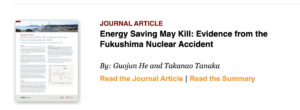
As the world warms with climate change, a clear dilemma emerges: While communities should reduce the amount of energy they use in order to mitigate emissions, they will also need to adapt to the changing temperatures by using more energy like through air conditioning. What happens when they don’t take steps to adapt? A new study tackles this question using a unique case study.
After the Fukushima nuclear accident in 2011, Japan gradually shut down all of its nuclear power plants, causing a countrywide power shortage. In response, the government launched large-scale energy-saving campaigns to reduce electricity consumption. The government paid particular attention to reducing the usage of air conditioning because it is the largest contributor to residential electricity consumption in Japan. A pair of researchers dug into the impact of these policies.
“Policies to reduce energy use and greenhouse gas emissions are indeed important to our future in order to reduce the severity of climate change,” says co-author Guojun He, the director of research at EPIC-China and an associate professor at the University of Hong Kong. “But climate change is already upon us and encouraging less use of air conditioning or other means of adapting to extreme temperatures can kill people living right now. A better approach when designing climate policies is to speed up the transition to clean energy and encourage people to use more clean energy to protect themselves, rather than limiting individuals’ electricity or energy consumption.”
Read More |